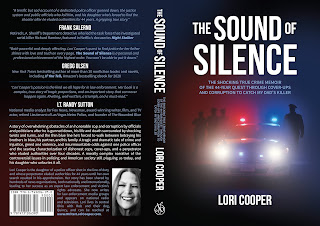EXPECT THE UNEXPECTED
By: Lori
Cooper
As recently as a couple of decades
ago, more of us were acquainted with our neighbors, and some of us could easily
go so far as to say our neighbors were not only friends, but also folks we even
considered a part of our extended Families. If by chance we didn't know the
names of some of our neighbors, however, we were at least comfortable with
extending a wave as a warm greeting and an acknowledgment of their
presence.
Though in stark contrast to those of
us who knew just about everyone on our Block thirty or forty years ago (beyond
the casual, obligatory wave), those tried and true friendly relationships with
our neighbors have all but gone by the wayside, and we've come to lower our
standards in that being able to at least identify the elderly retired woman who
routinely sits outside during certain hours of the day on her floral, outdoor
patio furniture, is now an acceptable version of a minimum, composite
description of what most of our individual neighbors look like.
Sociologists call such a relationship
among neighbors 'social cohesion.' It's considered among behavioral experts as
an ideology that everyone in a neighborhood benefits from some sort of
superficial relationships with their neighbors, with one very important caveat:
despite the lack of any semblance of a close-knit relationship with them,
they're people we can all say we at least trust on some level, and with whom we
have cooperative relationships. That's not to say Mister Rogers would have been
happy in such a neighborhood, but trust even among acquaintances weighs
favorably to all of us who receive the occasional delivery of some product at
our doorstep, as an example.
On the other hand, are we sacrificing
our own safety and that of our possessions for which we work so tirelessly
because it's no longer an important part of society's norm to know our
neighbors? Are we a society, now, which has reduced our standards that 'social
cohesion' with those who reside in our communities is enough? What about those
whom we don't know outside of our communities who socialize with our neighbors?
Are we supposed to be all-trusting of them when we have no idea who they are or
from where they hail? Does that, then, negate altogether one of The Ten
Commandments, which includes that we all 'Love Thy Neighbor'?
If Amazon delivered a package at 4 PM
which disappeared off your front porch, chances are you at least have the
capability of walking across the street and making the awkward, official Introduction
to discern if your neighbor saw a truck, a person leaving a package on your
front step or porch, and if you're lucky, these current standards of obligatory
social cohesive rules may or may not suggest an observation one way or another
if such a package ever reached your door. After all, retired folks tend to be
creatures of habit, and on a relatively quiet, residential street, usually can
provide invaluable information as to what type of person stopped by your house
and at what approximate time. But is this enough? Are we settling for less than
we all deserve? Isn't it possible that the very definition of 'social cohesion'
should likely incorporate with it some degree or degrees of distraction? On
whose shoulders, then, should such accountability fall?
We're also a society with tendencies
to blame others for our own shortcomings. And we routinely draw analogies as to
whose lives are busier than our friends, families, neighbors and our own, which
leads me to the whole point of this story: we all should learn to expect the
unexpected. We can acquiesce that it's impossible to be at the same place at
the same time, so why should we hold those who have no bearing on our
possessions responsible if they come up missing?
With property crimes at a nationwide
level of 1 every 13 seconds resulting in losses of approximately $14.3 billion
dollars per year, and Police solving just 13% of all cases where there were no
eyewitnesses or where there is a lack of physical evidence, perhaps 'social
cohesion' isn't enough. Perhaps those olden, golden days where everyone in our
neighborhoods does their due diligence to ensure we all know each other has
been a societal norm from which we never should have broken away; from which we
no longer can afford to stem the tide or make light of.
When people join forces, we're a
powerful, cohesive group and not one where a sociological term can ever solve
this type of a community problem, one that ostensibly has a direct impact on us
all. So, join forces with your neighbors. Get to know them well and to know
their routines. Watch out for each other. If crime happens to be higher in your
neighborhood or community, meet with your local Police officials as to how you
can become more educated, more informed, and more involved. The consequences of
those actions will only prove to lessen property losses and make everyone a bit
safer.
And the rule of thumb is to never take
action on your own if you're observing theft from your neighbor's house, as
much as you might want to do so. Call 9-1-1 and let your local Law Enforcement
officials handle incidents of crime. They're trained to handle certain
situations with appropriate tactical skills. The bottom line: expect the
unexpected but be smart about how you handle such matters, and always let your
local Police diffuse and deter and use the skills for which they were trained
to resolve the issue. Everyone will be safer as a result.
Finally, know and Love Thy Neighbor!
You'll be all the wiser for doing so, and before you know it, you'll forge friendships
you otherwise wouldn't have had - a win-win in everyone’s book every day!
Crime Statistics Source: FBI Uniform
Crime Reporting Statistics



Comments
Post a Comment